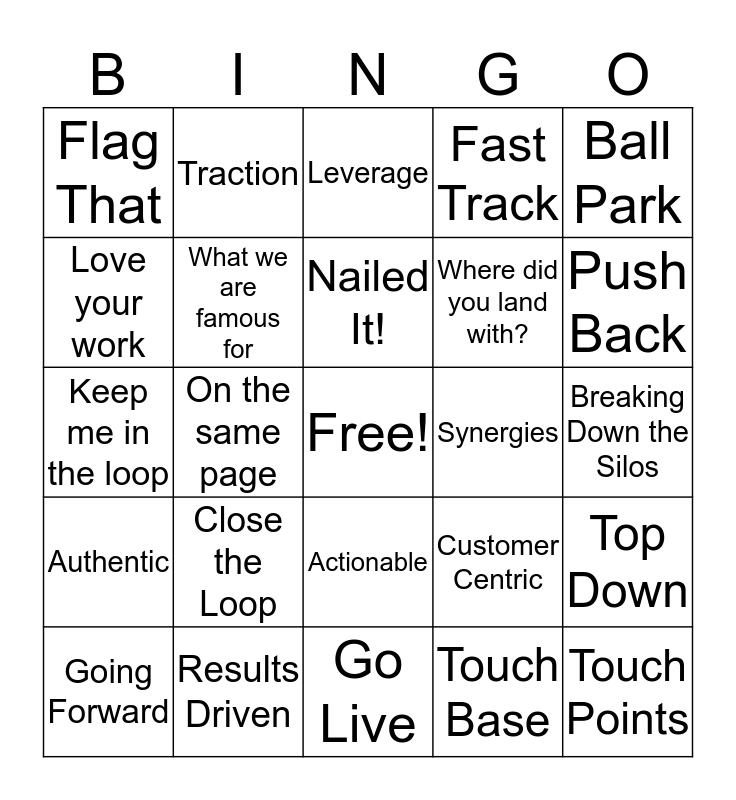
“We are tribal animals, and there is something about jargon that marks us as insiders – one of the tribe – will be protected and not eaten in the event of an attack by tigers.”Ĭohn hears a lot of jargon in her line of work, and even has her own favourite words: ‘ecosystem’, ‘swim lane’ (aka scope of someone’s job) and ‘peanut butter the raises’, which she says “means spreads evenly like a peanut butter sandwich”. New York City-based executive coach Alisa Cohn agrees. they will tussle, rival each other, look for leadership, listen to each other, pick up words and phrases will evolve from each other.” Putting business suits on a bunch of hairless primates and putting them together in an office block doesn’t really change them much. “We’re all the same species of bipedal mammal. “I don’t really think I believe that ‘business speak’ exists,” he says. Many use jargon simply to fit in, says Pullum. Think of these phrases catching on in the same way that avocado toast is the dish of the day and decluttering the new hobby. It is probably unhelpful to analyse business speak in a vacuum anyway. And as long as people find that frustrating, they’ll blame whatever words are used to create that.” It’s the context which people find frustrating. “It’s not the words themselves that are at fault.

Day-to-day working life can certainly be annoying, yet we still have to abide by rational workplace rules. That’s one of the many reasons McCulloch says that there’s “no cure” for business jargon. A phrase like ‘circling back’ is a more polite way of asking colleagues why they haven’t done something yet – minus the more charged words you’d actually rather say. “You’re using these phrases to signal that you respect the power differential and respect their time, yet you still have to bug them to follow up,” McCulloch says.

one person with more power than the other. That’s where corporate speak comes in – especially in a situation which involves a clear ‘power-dynamic’ i.e. There’s a social contract in place here: you have to show a certain amount of respect and decorum to those around you.īut you still need to get work done. McCulloch says that the words themselves are innocent bystanders in your frustration, but it’s “easier to take those frustrations out on a phrase than it is to admit that you’re annoyed with this other person and you don’t enjoy email and you wish you could just swear at the other person”.Īs much as you may want to lash out at your colleagues – for using jargon or any other reason – you cannot. In a way, he is right: anger with the words in an email isn’t actually what you should be mad about. “The people who suddenly turn on as ‘jargon’ are being irrational.” “Meanings evolve, rather slowly,” he says. The word has been in use since at least 1850, says Geoff Pullum, professor of general linguistics at the the University of Edinburgh. The phrase becomes as grating to hear as waiting for superiors to sign-off on the project itself.Ī word like ‘synergy’ that inspires ire is not harmful in itself. So, when you ‘run it up the flagpole’ for review, eventually the words stop being a tepid stand-in for getting approval for whatever ‘it’ is. “Euphemisms eventually take on the quality of the things that they’re being euphemistic for.”Ĭorporate language is like any other euphemistic speech. You see this everywhere – people dislike how teenagers talk because they have worries about where ‘the youth’ are going,” she adds. “In many cases when you see people disliking something about language, it’s more a symptom than a cause. She says the words associated with business speak are just euphemisms for all the frustrations we harbour about work: colleagues who we would not actually befriend in the real world, office politics and even the daily onslaught of communication. We don’t hate the actual words of corporate jargon, according to Gretchen McCulloch, internet linguist and author of the forthcoming Because Internet.


 0 kommentar(er)
0 kommentar(er)
